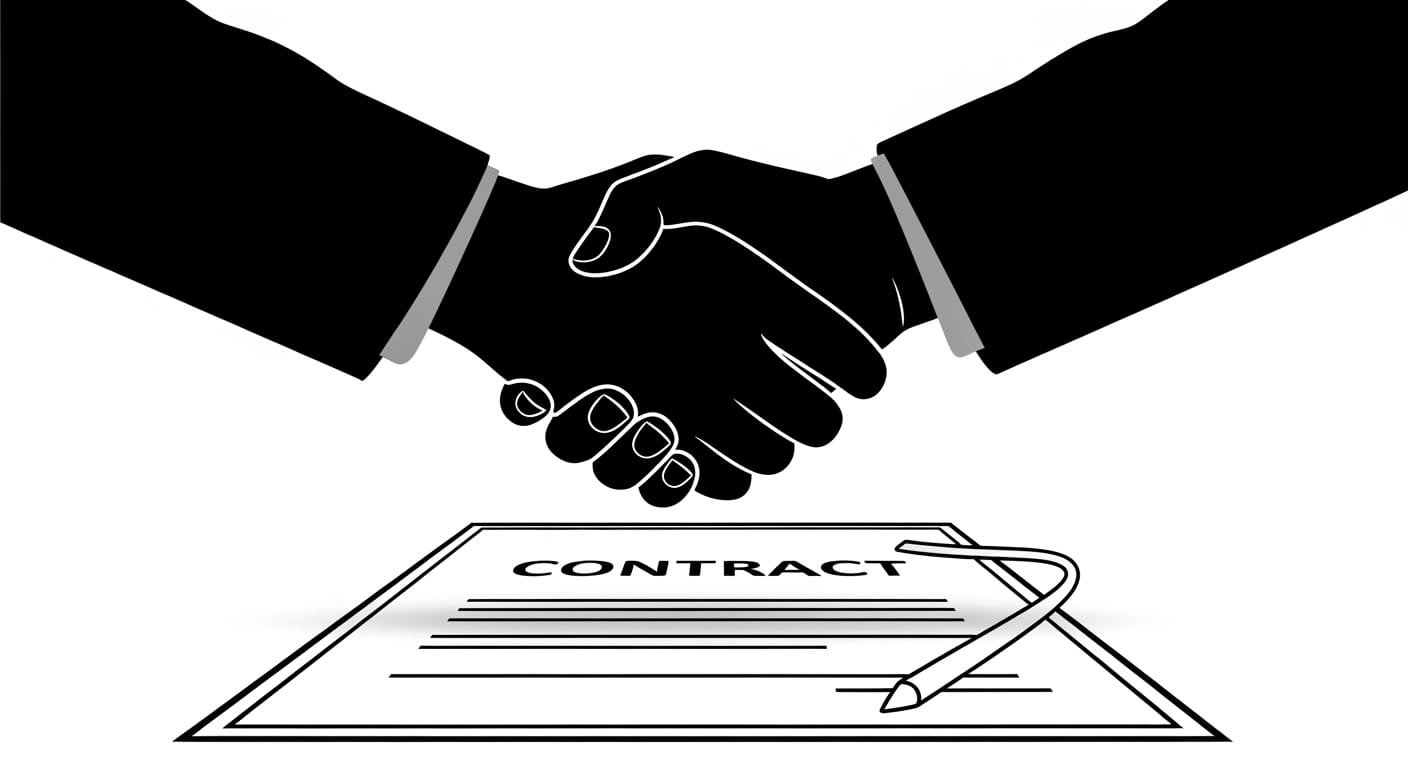Contract disputes are like family arguments—nobody wants to have them, but once you’re in one, it’s hard to figure out how to get out without some serious damage.
Whether the issue is unpaid invoices, missed deadlines, or that one time your vendor mysteriously forgot about your order entirely, resolving a dispute can feel like navigating a legal minefield.
Fortunately, negotiating a settlement is often the best way to avoid a full-blown legal battle and walk away with some measure of dignity—and hopefully a check.
The key to a good settlement is knowing how to approach it strategically. It’s not about “winning” (although let’s be honest, that would be nice) but finding a solution that both parties can live with.
Please Note: This post may contain affiliate links. If you click one of them, we may receive a commission at no extra cost to you. As an Amazon Associate, I earn from qualifying purchases.
So, let’s dive into some practical, occasionally humorous, but always effective strategies for negotiating settlements in contract disputes.

Top Takeaways and Key Concepts
Define clear goals before negotiating, knowing what you want and what you can compromise on.
Keep emotions in check, focusing on facts and avoiding personal attacks during discussions.
Gather all relevant evidence, including contracts, emails, invoices, and messages, to strengthen your position.
Consider a mediator if negotiations stall, using a neutral third party to facilitate agreement.
Document the final settlement in writing, including all terms, deadlines, and obligations of both parties.
Summary of This Article
The article provides practical strategies for negotiating settlements in contract disputes. It emphasizes defining clear goals, controlling emotions, and gathering evidence to support your claim. Using mediators can help resolve stalemates, while willingness to compromise ensures progress. Silence and the ability to walk away are strategic tools, and documenting the final agreement protects both parties. Following these steps increases the likelihood of reaching a fair, enforceable, and efficient settlement without resorting to litigation.
Start With Clear Goals

Before you even start negotiating, figure out what you actually want. Are you looking for financial compensation, a revised agreement, or just a heartfelt apology and maybe some flowers? Knowing your goals will keep you focused during the negotiation process.
Think about what the other party might want too. If you’re suing a contractor for unfinished work, they might be willing to fix the issues instead of paying damages. On the other hand, if money is your top priority, make sure you have a clear number in mind. You can’t hit a target if you don’t know what it is.
Having clear goals also helps you prioritize. Maybe you’re willing to compromise on the timeline as long as you get paid in full, or vice versa. The more flexible you are in areas that matter less, the more leverage you’ll have in areas that matter more.
Keep Your Emotions In Check

Let’s be honest—contract disputes can get emotional. You’re frustrated, the other side might be defensive, and everyone probably feels like they’ve been wronged. But letting your emotions take the wheel is a surefire way to derail any productive discussion.
If you feel yourself getting heated, take a breath. Focus on the facts and avoid personal attacks. Calling the other party a “lying, no-good weasel” might feel satisfying in the moment, but it’s not exactly going to inspire cooperation.
By staying calm and professional, you’ll not only keep the conversation productive but also signal to the other side that you’re serious about finding a resolution. Plus, it’s a lot harder for them to argue with you if you’re not yelling.
Gather Your Evidence
Negotiations are a lot easier when you have the receipts—literally. Before you start talking settlements, gather all the evidence that supports your claim. This could include contracts, emails, invoices, photos, and even text messages if they’re relevant.
Having solid evidence shows the other side that you’re prepared and that your case has merit. It’s like walking into a poker game with a royal flush. Sure, the other party might bluff, but they know you’ve got the goods.
On the flip side, be prepared for the other party to bring their own evidence. If they can poke holes in your argument, it’s better to find out during negotiations than in court.
Consider Bringing In A Mediator
If the negotiations are starting to feel like a bad game of tug-of-war, it might be time to call in a mediator. Mediators are neutral third parties who specialize in helping people find common ground. Think of them as the referees of the legal world, only without the whistles.
A good mediator can help both sides see the bigger picture and focus on solutions instead of getting stuck on petty arguments. Plus, mediation is usually a lot cheaper and faster than going to court, which is always a win.
Be Willing to Compromise
Settlements are about give and take. If you walk into negotiations expecting to get everything you want without budging an inch, you’re probably setting yourself up for disappointment.
That doesn’t mean you should roll over and accept whatever the other side offers. Instead, figure out what you’re willing to compromise on and what’s non-negotiable. Maybe you’re okay with accepting a smaller payout if it means resolving the dispute quickly, or maybe you’d rather hold out for the full amount even if it takes longer.
The key is to keep the big picture in mind. A settlement isn’t about getting everything—it’s about getting enough to make the headache worth it.
Use Silence to Your Advantage
Here’s a little-known negotiation trick: silence can be your best friend. If the other side makes an offer and you don’t respond right away, it can create pressure for them to keep talking—and potentially offer something better.
This isn’t about playing mind games; it’s about giving yourself time to think and making the other side wonder if their offer is good enough. Sometimes, the most powerful thing you can say is nothing at all.
Be Prepared To Walk Away
One of the most important strategies in any negotiation is knowing when to walk away. If the other party isn’t willing to meet you halfway or is making unreasonable demands, it might be better to cut your losses and pursue other options, like arbitration or litigation.
Walking away doesn’t mean giving up. It means recognizing that not all disputes can be resolved through negotiation. And who knows? Sometimes the mere threat of walking away is enough to bring the other side back to the table with a better offer.
Document The Agreement
Once you’ve reached a settlement, make sure everything is documented in writing. A verbal agreement might feel like a victory in the moment, but it’s not legally enforceable if things go south later.
The settlement agreement should include all the terms you’ve agreed on, including payment amounts, deadlines, and any actions the other party needs to take. Both sides should review and sign the agreement to make it official.
Documenting the agreement protects both parties and ensures there’s no confusion about what was agreed to. It’s the legal equivalent of tying a bow on the whole thing.
Conclusion
Negotiating a settlement in a contract dispute can be challenging, but with the right strategies, it’s possible to reach an agreement that works for both parties. Stay calm, be prepared, and remember that a little flexibility can go a long way.
At the end of the day, a good settlement is one where both sides walk away feeling like they’ve won—or at least like they’ve avoided something worse.
Suggested Resources:
How To Negotiate a Settlement Agreement
https://www.nolo.com/settlement-negotiation
The Role of Mediation in Contract Disputes
https://www.lawdepot.com/mediation-guide
Best Practices for Negotiating Legal Disputes
https://www.legalresources.com/negotiation-tips
Frequently Asked Questions
What is the first step in negotiating a contract dispute settlement?
The first step is defining your goals. Know what you want to achieve, identify areas where you can compromise, and determine your bottom line before discussions begin.
Why is it important to manage emotions during settlement talks?
Keeping emotions in check helps maintain professionalism and focus on facts. Emotional reactions can derail progress and make reaching a fair agreement more difficult.
What evidence should I gather before negotiation?
Collect all relevant documents such as contracts, emails, invoices, and communications. Strong evidence strengthens your position and supports your claims during discussions.
How can mediation help in contract disputes?
Mediation uses a neutral third party to facilitate compromise and communication. It’s often faster, less expensive, and less adversarial than litigation.
Why is compromise important in settlement negotiations?
Compromise allows both parties to reach a mutually acceptable resolution. Being flexible on minor issues can help secure better outcomes on key terms.
What role does silence play in negotiation strategy?
Strategic silence can create pressure for the other party to improve their offer. It also gives you time to think critically before responding to proposals.
Why should a settlement agreement be documented in writing?
A written agreement clearly outlines all terms, deadlines, and obligations. It protects both parties and ensures the settlement is legally enforceable.

Kevin Collier is a legal expert passionate about simplifying complex legal concepts for everyday individuals. With a focus on providing clear, practical information, he covers a wide range of topics, including rights, responsibilities, and legal procedures. Kevin aims to empower readers with the knowledge they need to navigate the legal landscape confidently, ensuring they can make informed decisions regarding their legal matters. Through insightful articles and easy-to-understand resources, he helps demystify the law, making it accessible to all.










